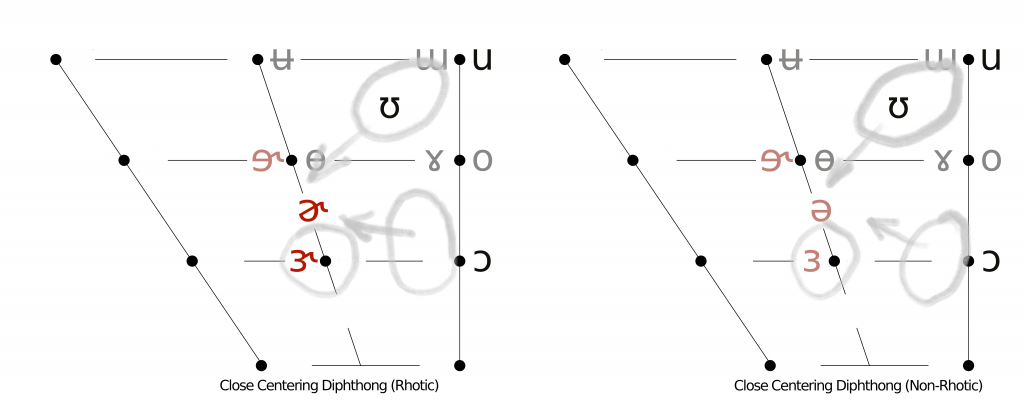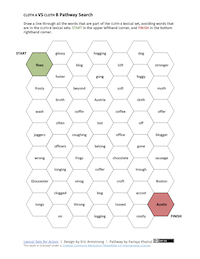24 The CURE Lexical Set
The cure lexical set features the vowel sound that appears least frequently in English. In many accents, it is part of the group known as the Centring Diphthongs, which go from the edge of the vowel space towards its center, towards schwa, with or without r-coloring. In this case, the traditional nucleus of the diphthong is comparable to foot or goose, with values in the range of [u ~ ʊ]. Depending on accent, the offglide can go from a relatively close position [uɘ̯˞/ʉɘ̯] to [ʊɚ̯/ʊə̯], to even [ua̯], especially in free or final position, as in some accents’ rendition of poor. Similar to goose, many cure words feature a leading yod [jʊɚ̯/jʊə̯], as in pure, though many accents where historical yod dropping has occurred may have either coalescence, as in assure—[əˈʃʊə̯] not [əˈsjʊə̯], mature—[məˈtʃʊə̯], not [məˈtjʊə̯]; or complete dropping after an alveolar, as in endure [ɛnˈdʊɚ̯], and after /r/ or /l/, allure [əˈlʊɚ] or rural [ˈɹʊəɹɫ̩].
However, for some (many?) accents, it seems at though this traditional pronunciation is not long for this world, as mergers with force and nurse are becoming dominant in many settings, with force pronunciations such as [ɔɚ̯/ɔ ~ o], and nurse [ɝ/ɜ] mainly for those with (historical) yod, as in pure, lure. Yod can occur (and also be dropped!) in these merged versions as well. The other option, rather than merging, is for cure to become a monophthong, as has happened with centring diphthongs in many accents in the UK, with vowels such as [ʉ] or [ɵ] taking over from [ʊə̯], especially before an intervocalic /r/, between two vowels, as in boorish, touring, curing, urine.
In some accents, goose + letter words such as sewer, fewer, viewer, usually [u.ɚ/u.ə], smooth to become a single syllable: [uɚ̯ ~ ʊɚ̯/uə̯ ~ ʊə̯] and so become merged with cure, or close to it. In many accents like this, the broken [u.ɚ/u.ə] can be used for emphasis. Note that Welsh has [uwə]—other accents, an in particular Australian ones, may have it too as [ʉwɐ ~ uwə], especially in free settings at the end of a word, cure Ⓐ.

- 🕊 Free: does not require a following consonant, and can exist on its own
 A Centring Diphthong, that moves from the periphery towards the center (schwa).
A Centring Diphthong, that moves from the periphery towards the center (schwa).- in stressed and unstressed syllables
Spellings
Wells, in devising the cure Lexical Set, created three subgroups that correspond to the context of where the vowel occurs in a word. Subgroups are subdivided further into ones without yod /j/, and ones with (historical) yod, though it may have coalesced into nearby consonants, or dropped in contemporary accents. For those with one or more merger, cure Ⓐ1, Ⓑ, and Ⓒ1 tend to merge with force, while Ⓐ2 and Ⓒ2 tend to merge with nurse (with some exceptions).
cure Ⓐ: in Free syllables
- no yod: ‹oor#, -our#›, as in boor, poor, Moor, spoor, dour*, your, tour, amour
- with yod: ‹ure#›, as in secure, mature, lure, Muir, procure, manure, liqueur, endure
cure Ⓑ: in Checked syllables ‹ourC›, as in bourse, gourd, gourmand, gourmet
cure Ⓒ: before intervocalic /r/
- no yod: ‹oorV, ourV›, as in boorish, poorer, tandoori, tourism, touring.
- with yod: ‹urV, euV›, as in during, security, rural*, fury, curious, euro, neural
Pronunciations
The nucleus of cure is frequently pronounced with a rounded central to back close vowel [ʉ ~ u ~ ʊ ~ ɵ ~ o], with an offglide (for those who have it) towards the center of the mouth. This offglide will be in the range of [ɘ̯ ~ ə̯ ~ ɐ̯ ~ a̯] for a non-rhotic accent, or [ɘ̯˞ ~ ɚ̯ ~ ɝ̯] for a rhotic accent. In emphatic pronunciations, some accents allow for breaking into two syllables, for example [u.ə/u.ɚ] or even [uwə/uwɚ].
In many rhotic accents, cure Ⓒ is merged with foot + /r/. For many accents where the nucleus of the vowel in these words is in the range of [u ~ ʉ] (such as in Scotland and much of Ireland), the underlying phoneme is likely to be goose +/r/, rather than cure or foot +/r/.
Personal Pronunciation: Preparation
Do you have a rhotic accent? Specifically, do you pronounce /r/ after a vowel in words like pure or poor? If so, your accent is rhotic, you have r-coloring; if not, it is non-rhotic, you lack r-coloring. Take a moment to say cure with the opposite of your pronunciation to be sure: try adding r-ishness to the end if you’re non-rhotic, and take it away if you are rhotic. How did you do that? Adding an /r/ sound usually means a curling or bunching action of the tongue; taking it away means inhibiting that /r/ impulse and (sometimes) includes relaxing your nucleus towards a neutral vowel in the center of your mouth. Or, you could just lengthen the nucleus. Compare your personal value in cure Ⓐ words, such as boor, tour, sure, lure with someone else’s and take a moment to think about how they do what they do, and how it is similar or different from your own pronunciation.
- As a non-rhotic speaker, you should be able to discern whether you use a single action monophthong for cure, or whether you offglide to some kind of mid-central(ish) vowel. If you do have an offglide, what vowel do you have for it? Many speaker’s values are found somewhere in the range of [ɘ̯ ~ ə̯ ~ ɜ̯ ~ ɐ̯], but maybe it goes somewhere else for you?
- As a rhotic speaker, your offglide will have r-coloring. Try to figure out how open/close your offglide is, exploring options like [ɘ̯˞ ~ ɚ̯ ~ ɝ]. Not only should you discern where in the vowel space your offglide sits, but also the degree of r-coloring you have. Note that it is also possible to have rhoticity through the entire vowel, with a rhotic monophthong, such as [ɝ], especially if your cure vowel is merged with nurse. Depending on the degree of r-coloring, you can add one or more “wings” to indicate how much you have: [uɚ̯˞˞]. (We’ll look at other, more fine-grained options for denoting rhoticity in the Alternate Pronunciations section below.)
cure & nurse and/or force: Before we dig into the nucleus of your cure diphthong, let’s quickly investigate whether you have a merger with nurse and/or force, or not.
Do the following words have:
the vowel of goose, foot, or (the start of) force/thought for their nucleus?:
boor, poor, moor, tour
the vowel of goose, foot, nurse or force/thought for their nucleus?:
secure, obscure, procure, manure, during, curious.
If they match the underlined vowel… Then you have at least some cure words that are merged. You may want to memorize spellings here so that you can identify these words for use in your accent work.
If they don’t match the underlined vowel… you don’t have that merger, and so you’re lucky that you have the instinctual ability to distinguish between the two sets. You’ll still want to explore the mergers as an option to adopt when doing other accents.
Is Breaking an Option? First, identify a word where you still have a cure diphthong in your speech, and if you don’t have even a single one, then adopt one or two to play with, such as poor and pure, which could easily be force and nurse respectively in your accent (or both force, I suppose!) Imagine an emphatic “It’s both POOR and PURE!” Can the diphthong in your speech break into two syllables? In more extreme situations, this will add a [w] between the nucleus and the offglide, something like [ˈpuwə/ˈpjuwə] in a non-rhotic accent, or [ˈpuwɚ/ˈpjuwɚ] in a rhotic one. This usually happens when people have an underlying goose vowel in their phonology, but not always. You don’t have to have the yod when it breaks, though: consider the similarities/differences between a sewer, and “to sue someone who identifies as she/her”: sue ‘er, with two syllables, but not a /w/. Might the words poor and pure break into two syllables, when spoken emphatically in phrases like “Not rich, but poor,” or “I hate bubbly water, not pure;” could they break into two syllables as they do in “sue-‘er”? If so, in those cases we’d transcribe them with a syllable break dot, as in [ˈsu.ɚ].
Personal Pronunciation: Articulation Options
 ⚠︎ When people explore their cure nucleus, some discover that they have a tendency to work in such an emphatic way that they go beyond their actual pronunciation to a kind of mental dictionary form, often in the realm of [u ~ ʉ], even though they might normally pronounce the diphthong with a more “lax” pronunciation, that is more in the realm of [ʊ ~ ɵ]. If you think this is the case for you, you might try recording your pronunciation of a word with cure in the middle of a short phrase like “My poor Aunt Alice,” or “The pure and simple truth.” Though we’re looking at the italicized word, chose to emphasize the underlined word, which will hopefully stop you from overemphasizing the cure word we want to listen to! Then, with the recording in hand, you can use software to slow it down so you can listen carefully to your personal pronunciation of cure.
⚠︎ When people explore their cure nucleus, some discover that they have a tendency to work in such an emphatic way that they go beyond their actual pronunciation to a kind of mental dictionary form, often in the realm of [u ~ ʉ], even though they might normally pronounce the diphthong with a more “lax” pronunciation, that is more in the realm of [ʊ ~ ɵ]. If you think this is the case for you, you might try recording your pronunciation of a word with cure in the middle of a short phrase like “My poor Aunt Alice,” or “The pure and simple truth.” Though we’re looking at the italicized word, chose to emphasize the underlined word, which will hopefully stop you from overemphasizing the cure word we want to listen to! Then, with the recording in hand, you can use software to slow it down so you can listen carefully to your personal pronunciation of cure.Focus in on your nucleus now. Begin by exploring any cure Ⓐ words that you have that aren’t merged with another set. (If all your cure words are merged with other sets, use those chapters to explore your vowel/nucleus first, and then come back here to explore alternate pronunciations). Examples to try include boor, poor, moor, tour, amour, lure, procure, endure. Use an audio or video recorder to listen carefully on your own, or work with a classmate, friend, coach or teacher to identify how cure in your speech compares with cure in others’ speech. Try lengthening the beginning sound of your cure vowel, and then try to shift it around in the vowel space by very small degrees—up, forwards, down, and back—use tiny increments, before falling away to your offglide, whether it has r-coloring or not. As this diphthong begins in the mostly close central or back place, you should feel the top surface of the back of your tongue moving delicately up and down as you experiment while keeping your tongue tip behind your lower front teeth. Notice how the back of the body of your tongue moves towards/away from your soft palate/velum/uvula, making more or less space in the back of your mouth. Take it to the extreme as well, to the most extreme pronunciation you might be able to make before it becomes some other lexical set in your mind (probably goose), and then fall off once more to your offglide. Where is your starting spot? Often the beginning of cure will include some lip rounding, though some speakers find that they have very little or none. Compare cure with force, foot, goat or goose, and see how great the contrast is between the nuclei of these vowels/diphthongs.
Transcribing cure: Decide which vowel symbol best suits the nucleus of your cure Ⓐ subgroup: [ʉ, u, ʊ, ɵ, o] . Does it essentially have a quality that is associated with goose or foot, or something else? Is it more forward [u̟] or further back, [ʉ̠]? Is it more open [ʊ̞], or more close [ɵ̝]? If you have a merger for part or all of cure with force or nurse, what is the nucleus/vowel of that/those set(s)?
If your cure nucleus is… (use whichever vowel symbol is appropriate for you)
- high, use the raised diacritic [ ʊ̝ ], a small T pointing up
- open, use the lowered diacritic [ ʉ̞ ], a small T pointing down
- pushed forward, use the advanced diacritic [ o̟ ], a tiny plus sign +
- pulled back, use the retracted diacritic [ ɵ̠], a tiny minus sign –
- mid-centralized, use the tiny x diacritic [ ʊ̽ ], “x-marks the spot”, moving the sound towards schwa in the middle of the mouth
If you have a rhotic cure diphthong, your coda might be
- close-mid central, so use an r-colored reversed-e, [ ɘ̯˞ ]
- mid central, so use an r-colored (or “flying”) schwa [ ɚ̯ ]
- open-mid central, so use an r-colored turned epsilon (or “flying three”), [ ɝ̯ ]
If you have a non-rhotic cure diphthong, your coda might be
- close-mid central, so use a reversed-e, [ ɘ̯ ]
- mid central, so use a schwa [ ə̯ ]
- open-mid central, so use a turned epsilon (or “three”), [ ɜ̯ ]
- nearly open central, so use the turned type-a, [ɐ]
- fully open central, so use the turned type-a with an open diacritic, [ɐ̞]
Alternate Pronunciations
KEY: When exploring the nucleus of a diphthong, ◌ is used as a placeholder for the offglide, [ ɘ̯˞, ɚ̯, ɝ̯ ] or [ɘ̯, ə̯, ɜ̯, ɐ̯].
Experiment with the cure Word Lists, Phrases and Sentences with the following nucleus options:
For those wanting to explore a force merger, see The force Lexical Set for further options.
For those wanting to explore a nurse merger, see The nurse Lexical Set for further options.
Off-glides:
KEY: When exploring the off-glide of a diphthong, ⬚ is used as a placeholder for the nucleus, such as [u̠, u̟, ʊ̜̽, ʉ, ɵ, o].
Now experiment with diphthongs that have off-glides that range from least open to most open [ ⬚ɘ̯˞, ⬚ɚ̯, ⬚ɝ̯ ] for rhotic, and [⬚ɘ̯, ⬚ə̯, ⬚ɜ̯, ⬚ɐ̯] for non-rhotic. Then, explore the offglides with a range of rhoticity, from no r-coloring to as much r-coloring as you can make, e.g. [ ⬚ɘ̯, ⬚ɘ̯˞1, ⬚ɘ̯˞2, ⬚ɘ̯˞3, ⬚ɘ̯˞4, ⬚ɘ̯˞5].
As you move the vowels in these directions, see whether that modified oral posture might inspire you to move the articulation of consonants and other vowels in the word in similar ways. Does it remind you of an accent other than your own?
Word Lists for cure Ⓐ1 in a Free Syllable, at the end of a word
KEY: ◾︎ cure in stressed syllable ◽︎ cure in unstressed syllable
⚠︎ These words are frequently merged with force.
-oor
-our
Word Lists for cure Ⓐ2 in a Free Syllable, at the end of a word
KEY: ◾︎ cure in stressed syllable ◽︎ cure in unstressed syllable
⚠︎ These words are frequently merged with nurse or force.
-ure
Word Lists for cure Ⓑ, sorted by the consonant that follows
KEY: ◾︎ cure in stressed syllable ◽︎ cure in unstressed syllable
⚠︎ These words are frequently merged with force.
PLOSIVES
-p
-b
-t
-d
-k
-ɡ
AFFRICATES
-tʃ
-dʒ
NASALS
-m
-n
-ŋ
FRICATIVES
-θ
-ð
-f
-v
-s
-z
-ʃ
-ʒ
APPROXIMANTS
-l/ɫ
-ɹ
Short Phrases
- Pity the poor boor.
- A luxurious azure hue.
- The allure of the moors.
- He got manure in his coiffure.
- Procure a new tandoor.
- Mourning your lost ones from Bournemouth.
- Courvoisier sponsored the tournament.
- I love the contours of my paramour’s face.
- The curator from Lourdes was well manicured.
- The tourists detoured around Eastbourne.
- I bought pure tourmaline earrings on Bloor Street.
- The gourmand isn’t a connoisseur, but a boorish glutton.
- The Moore family got their propane from Poore’s.
- Gourmet smoke-cured bacon-wrapped chicken tournedos.
- They ate Boursin cheese on their trip to Chambourcy (near Paris).

Sentences
Level 1
Short with 2-3 words, underlined
- A flute made from a gourd requires a different embouchure.
- The tambour top of the roll-top desk was secured prematurely.
- The security of Broadmoor psychiatric hospital was inaccurately reported.
- The epicure procured a pedicure.
- The craquelure on the cheek of the obscure portrait follows the contour nicely.
Level 2
Short with 4-5 words, underlined
- The immature Puritan’s luxuriant hair was strangely alluring.
- Muriel’s grades were poorer at Missouri than they are at Moorhead.
- Are you curious about the spurious and injurious claims against the Fast & Furious franchise?
- The rural curate restored the obscure mural in the Truro cathedral.
- You’re feeling reassured that the squash and bourbon soup du jour has no impurities.
Level 3
Medium with 3-4 words, not underlined
- I’m not sure that Curity bandages are made of pure cotton.
- The jury heard the furious man describe his trip from Uruguay to Honduras.
- The courier from the Bureau pushed the tourist in the Douro river.
- The bus to the Ruhr valley smelled of urine and cured meats.
- Delacour ensured that the prisoner was inured to being immured in prison.
Level 4
Hard with 4-6 words, not underlined
- The formerly demure Mr. McClure has matured to the point of being luridly prurient.
- The jurisdiction of the bourgeois bureaucracy is outlined in the brochure.
- The dour Moor had an ouroˈboros tattoo, with a snake eating its tail, tracing the contour of his shoulder.
- The poorest dancers in the touring company did pas-de-bourées furiously.
- The uninsured parkourist avoided the detour but injured the security guard.
Mergers
force–cure Merger: Sometimes called the pour-poor merger, it can heard in many accents of American, Australian and New Zealand English, where it can be limited to cure Ⓐ1 & Ⓒ1, while in the South of England, the merger may be more consistent across all subsets of cure.
force–cure minimal pair/homophones can include: boar=bore/boor, gored/gourd, lore/lure, more/moor, pore=pour/poor, shore/sure, tore/tour, yore=your/you’re. (Note that the underlined options, in some accents, are merged with nurse rather than force.)
-
- The bored boor was sure he tore his shorts on the tour of the shore.
- You’re luring him on the trip with your lore about more Moors from days of yore.
- I always adore a good manicure and pedicure, but I can’t afford it anymore.
- The historian was extremely territorial and furious at the security guard who entered her office without her knowledge.
- After every successful sport tournament, I feel so much more self-assured, on and off the court.
nurse–cure Merger, aka Fur-Fury: Many cure words are in the process of merging with nurse instead of force, especially when it follows yod [j], or “historical yod” which is assimilated into the consonants [ʃ, ʒ, tʃ, dʒ, l, ɹ] as in pure, assure, azure, caesura, mature, injurious, alluring, rural.
This occurs primarily in North American accents, though it is happening in Australia and New Zealand, too. Ignoring the yod, Near Minimal pairs/rhyming words include cur=curr/cured, curd/cured, furry/fury, per=purr/pure.
Experiment with making them match using these nurse options: [ɘ˞, ɚ, ɝ, ɵ˞, ɞ˞] (rhotic), or [ɘ, ə, ɜ, ɵ, ɞ] (non-rhotic).
Make a distinction between them as nurse and cure: [ɘ˞/uɚ̯, ɚ/ʊɚ̯, ɝ/o̞ɚ̯, ɵ˞/ʉɚ̯, ɞ˞/ʊɝ̯] (rhotic), or [ɘ/uwə, ə/ʉə̯, ɜ/ʊə̯, ɵ/o, ɞ/ɵ] (non-rhotic)
-
- Kirby cured the furry cur and lured the mature cat with cheese curds.
- The burley, coiffured merman’s manicure made me spill my third liqueur.
- The entrepreneur had such an allure to them but sold an obscure product that deterred the venture capitalists from investing in it.
- I was thankfully insured for the accident that occurred when I was watching birds while I toured Europe.
- The curious furry kitten was happily purring in their new luxurious home.
Splits
There are no known Splits of the cure Lexical Set.
Review
Pathway Puzzles

Pathway Puzzles allow you to practice finding members of a lexical set. Choose the next cell with the FIRST lexical set word to make a pathway from the START of the puzzle down to the FINISH. Open the KEY document to see the solution, and check your work. Pathway Puzzles were created by Farisya Khairul, through support from a AMPD Minor Research Grant.
cure – north Pathway Puzzle | KEY
A vowel that changes state, with a nucleus that begins on the periphery of the vowel space and moves toward a coda that is in the middle of the mouth, usually schwa /ə/. Here, we mean the sets NEAR, SQUARE, START, NORTH, FORCE, and CURE, whether they are rhotic or not. (US spelling: centering diphthong. )
A consonant that is between two vowels; another word for "medial".
When applied to a diphthong, "breaking" is a process where it becomes two syllables. When applied to a monophthong, it tends to mean diphthongization, where a mid-central schwa is added. The opposite is "smoothing"

